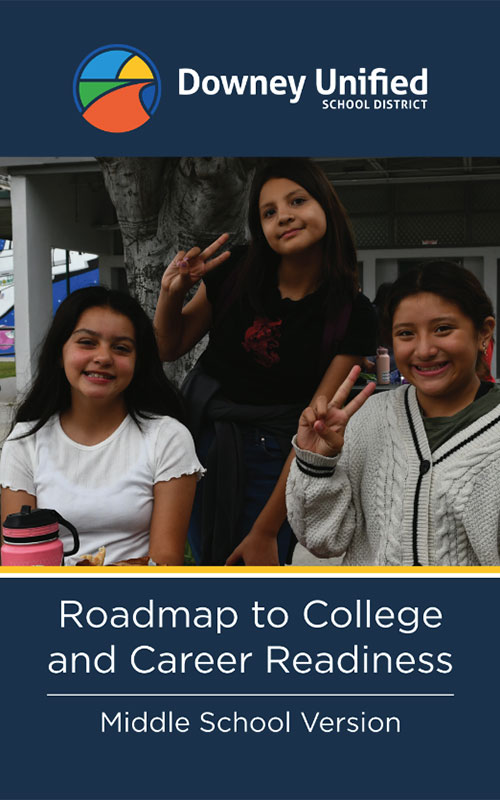At Downey Unified, we are committed to ensuring that our students are prepared for college and their desired career fields as they become self-motivated learners and responsible members of society. To provide our students with as many opportunities as possible, we offer various programs that will allow them to advance their learning at more accelerated rates and even earn some college credits!

For college-bound students, earning college credit while still in high school can make all the difference. It can bolster your college applications, save you money on future tuition and speed up the amount of time it takes to finish your degree. You’ll get some of your general education courses out of the way now and get an idea of what college courses consist of. In Downey Unified, college credits are available through three opportunities: Early College Program, Dual Enrollment and Advanced Placement (AP) classes.
Free Resource
The Roadmap to College and Career Readiness is your comprehensive guide to success.
EARLY COLLEGE PROGRAM
- Application-based
- ONLY incoming 9th graders are eligible
- Requires a 4-year commitment
- Graduate HS with 46.5 CSU / UC-approved credits
- Only offered at Downey and Warren High Schools
- No cost to the family
- Courses are taught by Cerritos professors
- Increases GPA
DUAL ENROLLMENT
- Available to ALL grade levels
- Commit to one semester at a time
- More self-paced, a la carte offerings
- Graduate HS with some college credits- CSU and/or UC-approved credits
- Depending on the classes available may be offered to Columbus, Downey, and Warren High School students
- No cost to the family
- Courses are taught by Cerritos professors
- Increases GPA
ADVANCED PLACEMENT (AP)
- AP Course offerings vary per grade level & school site
- Offered at Downey and Warren High Schools
- Year-long courses taught by Downey Unified high school teachers
- Implements college-level curriculum provided by College Board
- At a cost to the family, an optional AP Exam specific to the AP course is offered in the spring
- Can receive college credit if the student earns a score of 3, 4, or 5 on the designated AP Exam
- Issuance of college credit for a passed AP Exam is at the discretion of the university
- Increases GPA
Early College Program
One way that students can get a head start in college is to take part in the Early College Program, which allows students to take Cerritos College courses at their high schools and complete approximately 46.5 units that are transferable to a California State University system and/or University of California system school while earning their high school diplomas at the same time.
This program, taught by Cerritos College professors, helps students get a feel for what college is like and better prepares them for life after graduation while still allowing them to experience high school and make lasting memories with their friends and classmates.

In the Early College Program, students will also benefit from free tuition and books, the ability to save time and money throughout college, the opportunity to earn an associate’s degree during high school (additional classes required), and access to several services provided through Cerritos College.
You can find additional information as well as how to apply to the program on our DUSD Early College Program web page.
Dual-Enrollment Program
Another way students can save time and money during their college journeys by earning college credits during high school is to participate in Downey Unified’s Dual-Enrollment Program, which offers a variety of available courses that count toward high school diplomas, increasing your GPA, and helps students jump-start their higher education studies.

Similar to the Early College Program courses, the Dual-Enrollment Program classes are taught by Cerritos College professors, and are free and transferable to schools within the CSU and UC systems. Additional benefits for students include the increased likelihood of graduating and attending four-year colleges, opportunities to earn bachelor’s degrees more quickly, and saving a significant amount in tuition expenses while attending college. In fact, by earning college credits in high school, students can potentially save up to two years’ worth of the cost to go to college.
Additional information and answers to frequently asked questions pertaining to dual enrollment can be found on the DUSD site.
Advanced Placement
For students who wish to take all of their courses through their high schools and remain in their high school classrooms, Advanced Placement classes provide students with the chance to complete college-level work and earn college credits and placement.
At the end of an AP course, students have the opportunity to take the AP exam, which could potentially earn them college credits, depending on the scores they earned. Most AP students who enroll in four-year colleges or universities start their higher education journeys with some credits before ever setting foot on campus. This helps students not only save money but also helps them have more time in their schedules and sometimes even graduate early. As a result, many AP students have more flexibility to change their majors, pursue second degrees, study abroad, and take part in internships.
Taking AP courses can also help students become more prepared for college, have higher academic success rates, discover their passions, and increase their GPAs. Additionally, students in AP classes demonstrate to college admissions officers that they have made concerted efforts to improve their educational experiences so that they are more likely to succeed in college and beyond.

You can find more information about each high school’s AP program on its website: Downey High School and Warren High School.
Regardless of which path your student takes, the teachers, counselors, and administrators at all of our campuses are readily available to help offer guidance and support. You can reach out to those individuals on your student’s campus with any specific questions or concerns you have.
